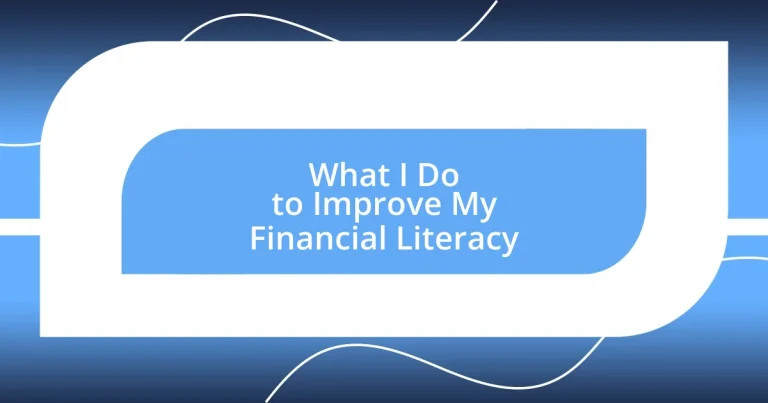Key takeaways:
- Financial literacy involves understanding budgeting, saving, investing, and credit, leading to informed decision-making and financial freedom.
- Clearly identifying short-term, mid-term, and long-term financial goals helps create a path for managing finances more effectively.
- Utilizing various resources such as books, online courses, podcasts, and financial tools enhances knowledge and encourages continuous monitoring of financial progress.
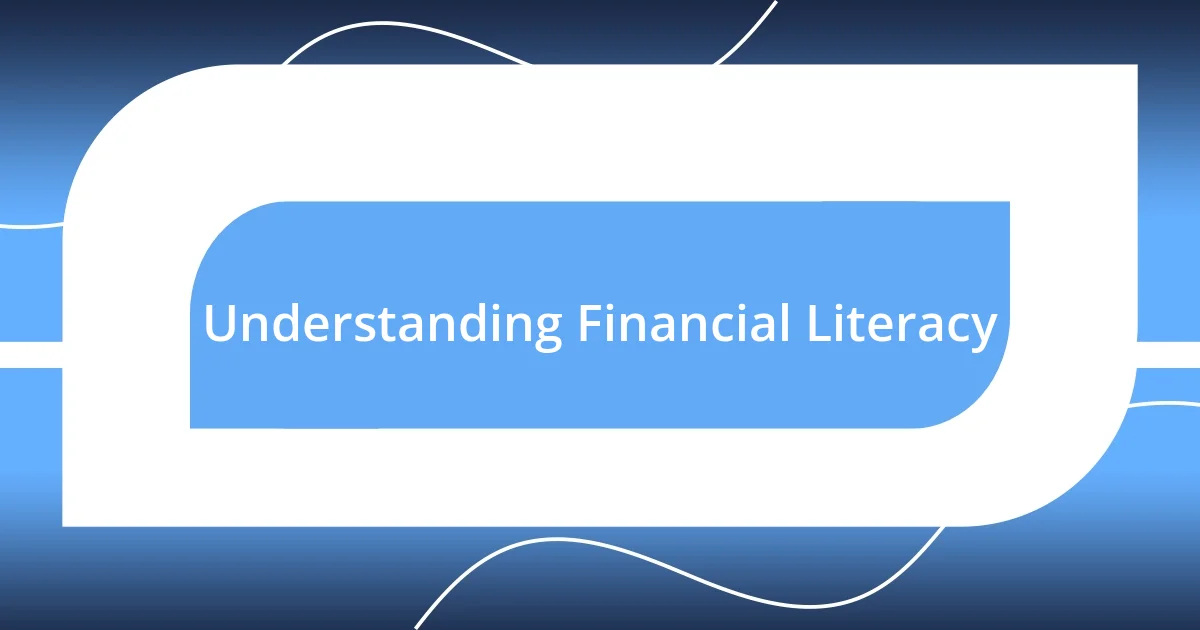
Understanding Financial Literacy
Understanding financial literacy goes beyond just knowing how to budget or invest; it’s about empowering ourselves to make informed decisions that affect our future. I remember when I first sat down to review my finances; I was surprised at how little I truly understood about my spending habits. That moment sparked a realization: if I wanted financial freedom, I needed to dive deeper into this topic.
As I expanded my knowledge, I discovered that financial literacy involves comprehending various concepts, like saving, investing, and understanding credit. I can’t tell you how liberating it felt when I finally grasped the significance of building credit scores and how they affect everything from loan approvals to interest rates. Have you ever felt that thrill of mastering a once-mysterious concept? That spark of clarity is a motivator that keeps me engaged.
Moreover, financial literacy is about continuous learning and adapting to change. I often find myself reading articles, listening to podcasts, or participating in workshops to stay informed. It’s fascinating to reflect on how much the financial landscape shifts, especially with new technology. How often do you check your financial knowledge? It’s a journey I embrace, knowing it leads to better choices and ultimately, a more secure future.

Identifying Personal Financial Goals
Identifying personal financial goals is a crucial step in taking charge of your financial journey. When I first contemplated my financial future, I felt overwhelmed by the myriad of directions I could take. However, I realized that breaking it down into specific goals helped me chart a clearer path. It was like navigating a maze—once I identified my destination, getting there became much more manageable.
To pinpoint your financial goals, consider these key aspects:
- Short-term Goals: These could be things like saving for a vacation or paying off a credit card. I remember setting a goal to save for a new laptop, and each small deposit felt like a victory.
- Mid-term Goals: Perhaps you want to buy a home or fund a significant life event, like a wedding. I once saved for a friend’s wedding, and it taught me the value of not just saving, but also planning.
- Long-term Goals: Think about retirement or long-term investments. I often visualize my dream retirement—traveling the world, and that inspires me to invest wisely today.
By clearly defining what I want to achieve, I found a renewed sense of purpose in managing my finances.
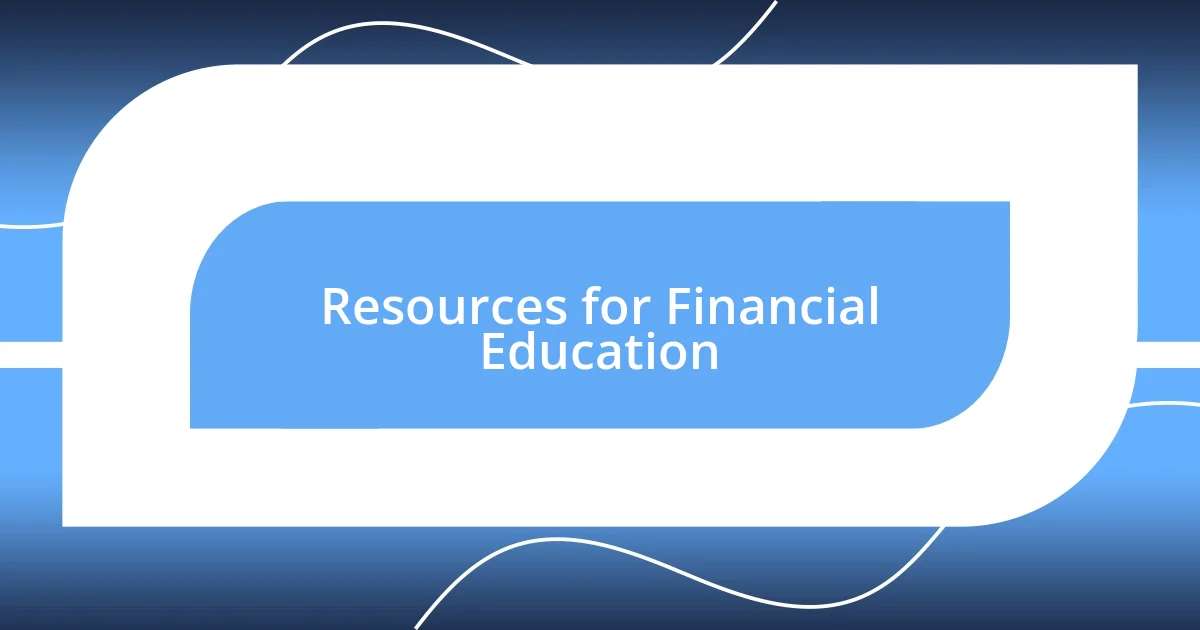
Resources for Financial Education
When it comes to enhancing my financial literacy, I’ve found numerous resources that have genuinely helped me expand my understanding. Books have been a cornerstone of my education; I recall picking up “The Total Money Makeover” by Dave Ramsey. It felt like having a mentor guiding me on my financial journey. They offer practical advice that resonates with many people, and I appreciated how actionable the content was. Have you ever read something that completely shifted your perspective?
Online courses have also played a significant role. Platforms like Coursera and Khan Academy offer free classes on personal finance that are both informative and engaging. I remember taking a course that delved into investment strategies, and it helped demystify some concepts I’d previously found intimidating. Learning from experts in the field is something I highly recommend for anyone eager to grasp new financial skills.
Lastly, podcasts have become a staple in my daily routine. I enjoy listening to shows like “The BiggerPockets Podcast,” which share inspiring stories from real estate investors. It was while tuning into an episode that I first considered exploring real estate as an investment—a thought that has since grown into a concrete goal for me. Each resource uniquely contributes to my financial acumen, and I encourage everyone to explore what resonates with them.
| Resource Type | Description |
|---|---|
| Books | Offer deep insights, actionable advice, often through storytelling. |
| Online Courses | Provide structured learning on various financial topics, often free or low-cost. |
| Podcasts | Delightful and engaging discussions with experts, sharing practical tips and real-life stories. |
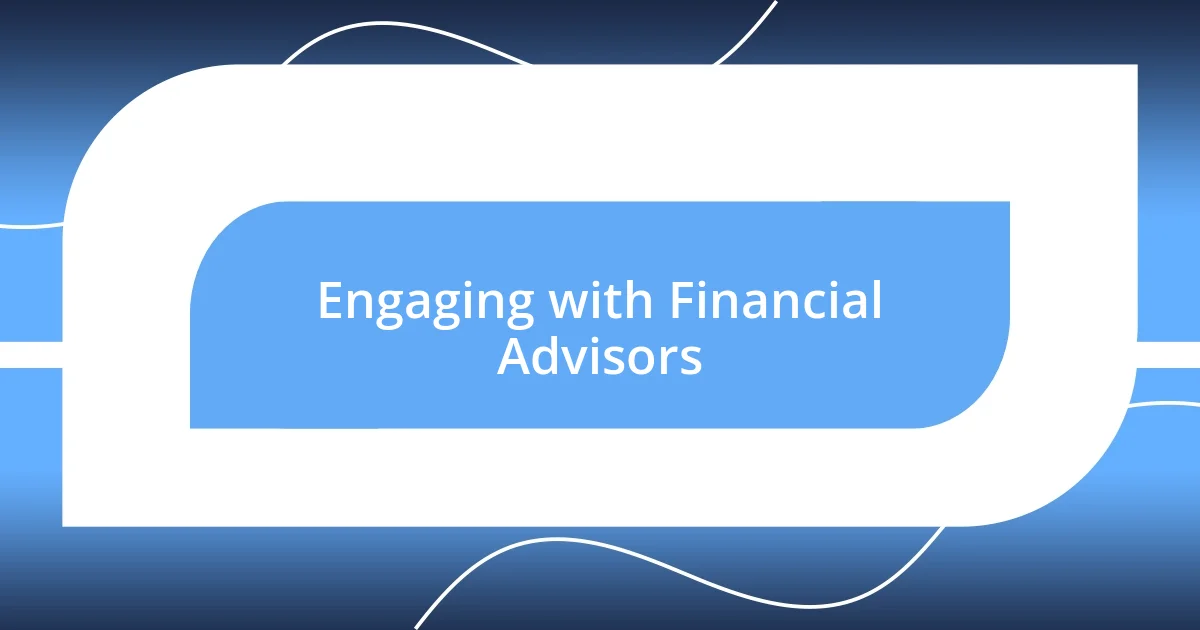
Engaging with Financial Advisors
Engaging with financial advisors is an experience that can both enlighten and empower. I remember the first time I sat down with a financial advisor; it felt like unlocking a treasure chest of knowledge. They not only clarified complex topics like asset allocation and retirement planning but also provided personalized strategies that aligned with my unique goals. Have you ever found yourself caught in financial jargon, feeling lost? A good advisor breaks that down into understandable terms, making the journey smoother.
I believe it’s crucial to approach the conversation with an open mind. The strategies might challenge your existing beliefs, and that can be uncomfortable. For instance, I had a preconceived notion that I should be saving every penny. My advisor helped me see that investing, even in small amounts, is equally important. This new perspective felt liberating! I often think about how many people miss out on valuable insights simply because they hesitate to engage with a professional guide.
Additionally, don’t shy away from asking questions during your meetings. I’ve found that the best insights often come from simple queries. Once, I asked my advisor about the impact of market fluctuations on retirement accounts. His response revealed strategies I never considered, ultimately changing my investment approach. So, how do you envision your financial future? Engaging with a financial advisor can be a pivotal step in turning your aspirations into a tangible plan.
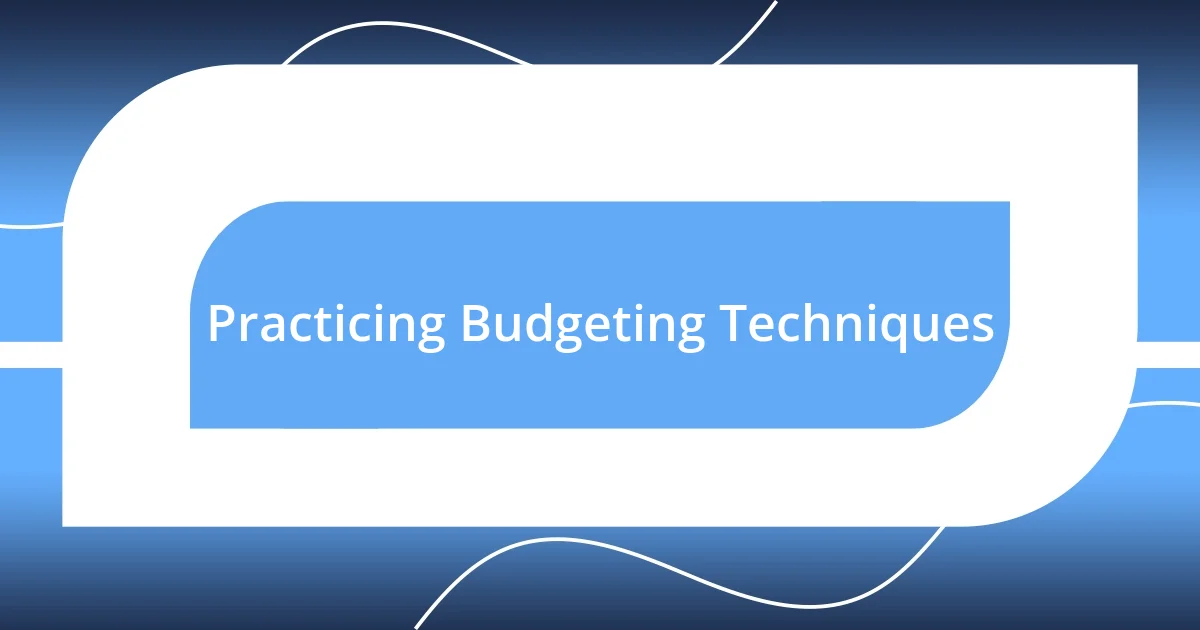
Practicing Budgeting Techniques
Practicing effective budgeting techniques has been a game changer for me. I started with the classic zero-based budget method, where every dollar has a purpose. Initially, it felt tedious to track expenses meticulously, but I quickly noticed my spending habits shifting. Have you ever felt the thrill of gaining control over your finances? For me, it became empowering to see a clear picture of where my money was going each month.
I also discovered the power of the 50/30/20 rule, which suggests allocating 50% of my income to needs, 30% to wants, and 20% to savings and debt repayment. I remember sitting down to analyze my budget for the first time using this technique. It was an eye-opening experience to see my “wants” category—it showed me where I could make adjustments. Sometimes, those small savings can accumulate into something significant over time. Can you imagine where you could be financially if you just shifted a little focus?
Another budgeting technique that resonated with me was creating a sinking fund. I set up separate savings for anticipated expenses like vacations or home repairs, effectively reducing financial stress. I can vividly recall the relief I felt when I went on a trip without worrying about credit card bills afterward. That’s the beauty of a proactive approach to budgeting; it transforms potential financial burdens into planned blessings. Have you tried setting aside funds for future expenses? It might just bring you that same peace of mind.
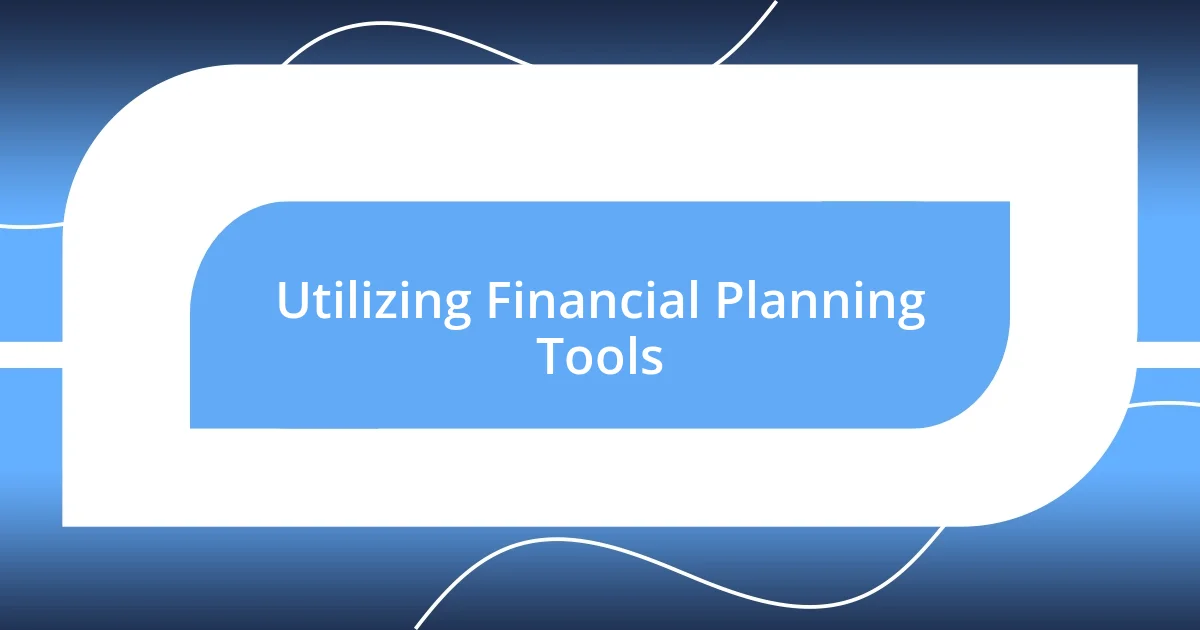
Utilizing Financial Planning Tools
Utilizing financial planning tools has been integral in refining my financial literacy journey. Online budgeting apps are my go-to resources—they’re like having a personal accountant at my fingertips. I remember the first time I downloaded one; it turned my chaotic financial overview into a sleek, organized layout. Does it feel overwhelming to consider your finances? I found that having everything in one place made it a lot easier to identify areas for improvement.
Another invaluable tool has been investment tracking software. This platform not only helps me see my portfolio’s performance but also breaks down how individual investments contribute to my overall financial goals. I love checking it weekly; it’s both exciting and educational to watch my strategies in action. Have you ever felt unsure about your investments? Tracking my progress has given me the confidence to explore new opportunities and adjust my strategies based on real-time feedback.
Lastly, I often turn to interactive financial calculators for estimating retirement savings or mortgage payments. These tools provide instant insights that help me craft realistic plans. I distinctly recall using one to calculate how much I needed to save each month for my dream vacation. It was illuminating to see how small contributions could add up over time. What small steps do you think you could take to reach your financial goals? Exploring these tools can really make a difference in how you approach your financial future.
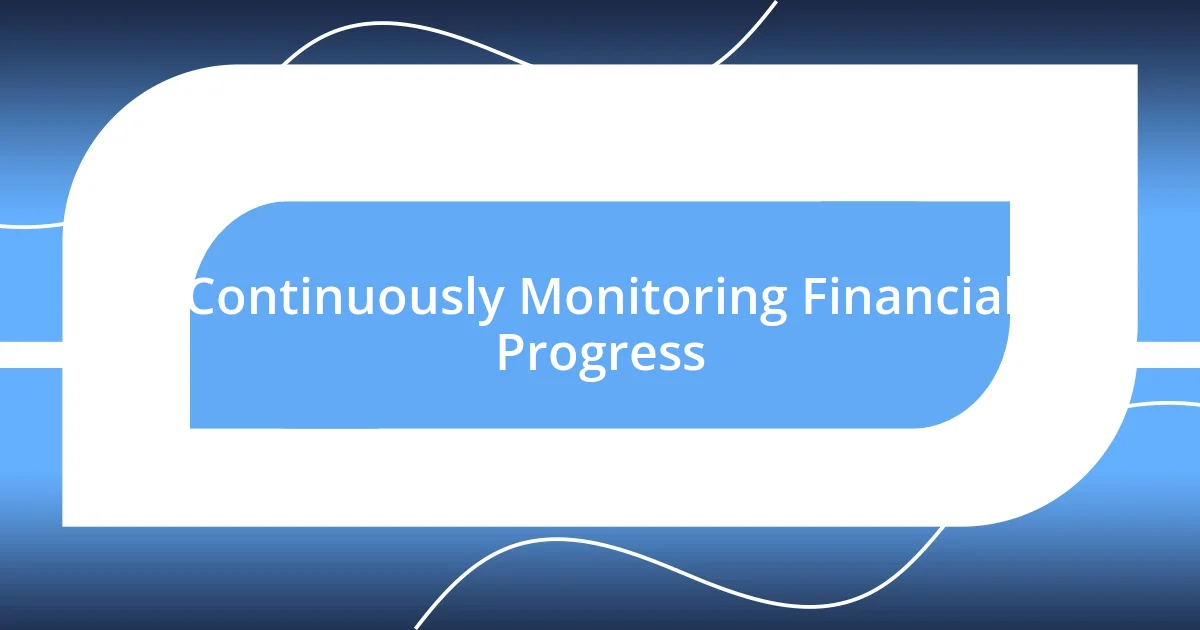
Continuously Monitoring Financial Progress
Monitoring my financial progress has become a crucial routine in my journey toward financial literacy. I often set aside time each month to review my budget and actual expenses side by side. The first time I did this, it felt like peering through a magnifying glass into my financial habits—certain spending patterns surprised me. Have you ever faced the realization that you’re spending more on takeout than you thought? That moment led me to make meaningful adjustments.
I can vividly recall one month where I noticed an unexpected spike in my utility bills. Instead of brushing it off, I dove deeper, comparing previous months and identifying the culprits. This proactive approach not only helped me cut unnecessary expenses but also empowered me to negotiate better deals with service providers. How often do we let those small annoyances slide instead of tackling them head-on? Regularly scrutinizing my finances has transformed these little surprises from stressors into opportunities for growth.
Another practice that has enriched my understanding of financial progress is setting measurable goals. For instance, when I aimed to boost my savings, I established a specific percentage of my income to set aside monthly. Each time I successfully hit that target, I celebrated those milestones, whether with a small treat or simply patting myself on the back. Doesn’t it feel fantastic to visualize progress? Celebrating those small wins has fortified my commitment to continuous monitoring, making the process feel less like a chore and more like a rewarding challenge.












